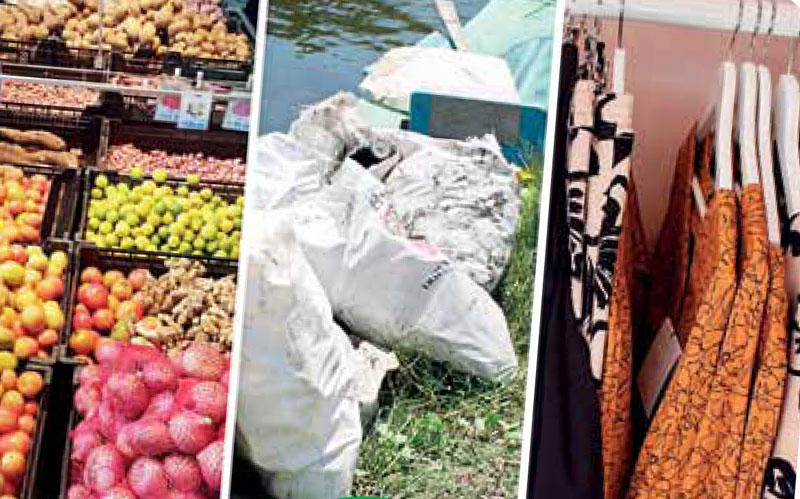Tuesday Feb 17, 2026
Tuesday Feb 17, 2026
Saturday, 20 November 2021 00:00 - - {{hitsCtrl.values.hits}}

Ethical entrepreneurship can span different sectors, for example food, waste management, fashion, or tourism
The concept of entrepreneurship entails starting, running, and scaling up small businesses and business initiatives. Ethical and sustainable entrepreneurship means that these businesses should be built according to a certain set of standards, aiming to achieve not only economic success but also contribute to human, animal, and environmental wellbeing.
The elements of ethical entrepreneurship
In practice, ethical entrepreneurship can take many forms. On the one hand, it can be about developing and promoting sustainable, cruelty-free, and climate-friendly products, for example plant-based food or drinks. On the other hand, it can optimise its processes to reduce the ecological footprint and emissions and ensure that they do not harm animals, humans, or the environment.
Furthermore, ethical entrepreneurship can include short supply chains and local sourcing of materials, decent pay for workers, energy efficiency, inclusive and participatory decision-making, and holistic risk management. Sustainability is also an important consideration for packaging, transport, storage, and marketing, as well as the selection of suppliers, partners, and networks.
In an ethical enterprise, aspects of sustainability, climate-friendliness, resilience, and social responsibility are mainstreamed across all levels. At its core, this is about acknowledging environmental and social problems and then addressing them, for example by building good structures, establishing a healthy organisational culture, and following principles of transparency and accountability.
Accelerating the start-up ecosystem
Sri Lanka has a young population, with almost half the country’s people below the age of 30. There is a pool of potential innovators and entrepreneurs that could start businesses and implement ideas across various sectors, but who are often in need of capacity-building and support to do so. If Sri Lanka’s start-up ecosystem can be directed toward sustainable, ethical, resilient, and climate-friendly enterprises, this could present a significant opportunity to benefit both economy and society.
How can this potential be tapped? Young entrepreneurs, particularly those coming from rural areas, might have ideas and motivation, but they need support when it comes to the practical issues of starting and running a successful enterprise. More than just a willingness to take risks, setting up a business requires seed funding, business and management skills, legal knowledge, strategic thinking, and communication skills.
Training programmes, workshops, and other capacity-building activities can help to close existing capacity gaps, especially if they target groups such as youth, women, or rural communities. Business skills and entrepreneurship could be integrated into education curricula, and specific entrepreneurship modules into business education, improving the skill- and mindset of young people and providing them with a basic toolkit to build on.
Another opportunity to strengthen ethical entrepreneurship is establishing accelerators and support systems that help individual entrepreneurs, but also the local start-up ecosystem overall. Ethical accelerators can fulfil an important function and build the capacities of young entrepreneurs on how to develop their concept into an initiative and understand the economic context for startups, as well as concept of sustainability, carbon footprint, ethical production, inclusiveness, integration, animal welfare, and resilience. Furthermore, they can strengthen an entrepreneurial mindset and provide support for aspects such as marketing and outreach, setting up and registering legal entities, fulfil fiduciary requirements, bookkeeping, and financial reporting, and identify potential sources of investment as well as avenues of growth.
Harnessing the potential of ethical entrepreneurship
Ethical entrepreneurship can focus on different sectors, for example food production and hospitality, waste management, or sustainable fashion. It can incorporate natural ecosystems, such as through ecotourism activities, and contribute to mitigating climate change by designing clean products and solutions. In a time of climate change and the COVID-19 pandemic, the need for new approaches is clear. Fostering the potential for ethical entrepreneurship and sustainable enterprises can enhance the economy as well as benefit people, the environment, and the climate.
(The writer works as Director – Research & Knowledge Management at SLYCAN Trust, a non-profit think tank based in Sri Lanka. His work focuses on climate change, adaptation, resilience, ecosystem conservation, just transition, human mobility, and a range of related issues. He holds a Master’s degree in Education from the University of Cologne, Germany and is a regular writer to several international and local media outlets.)